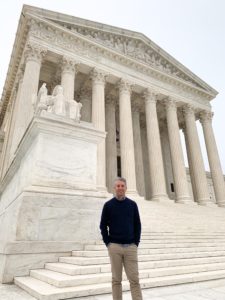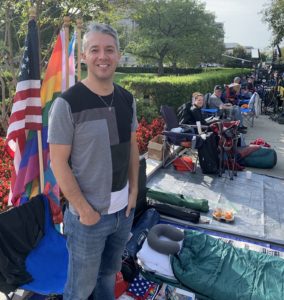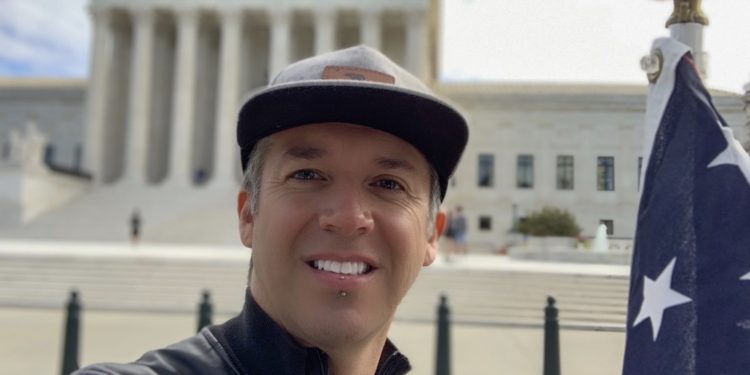By Eddie Reynoso
Equality Business Alliance, executive director
On Tuesday, Oct. 8, the U.S. Supreme Court heard oral arguments for a trio of cases that dealt with federal employment protections for LGBTQ+ employees. I flew to Washington D.C., and camped out for three nights and four days just to secure one of only 50 seats reserved for the public inside the nation’s highest tribunal.
Two of the cases, Gerald Lynn Bostock v. Clayton County, Georgia, and Altitude Express, Inc., et al. v. Melissa Zarda, as Executor of Estate, were consolidated. Heard together, this raised the question if Title VII of the Civil Rights Act of 1964 offers protections for sexual orientation. A subset definition of sex, like sexual harassment is included as a subset definition of sex. The third case, R.G. & G.R. Harris Funeral Homes, Inc. v. Equal Employment Opportunity Commission, & Aimee Stephens raised the question whether gender identity or gender expression is a form of sex discrimination and therefore prohibited. Title VII of the Civil Rights Act of 1964 bars discrimination on the basis of sex, but says nothing explicitly about sexual orientation or gender identity.
As executive director of the Equality Business Alliance, I felt it was important that San Diego’s business community have a voice in national discussions and litigation that affects the LGBT business community. Not only in San Diego, but around the nation and the world.

Since 2014, for far too long, San Diego’s business community has not had a voice in local, regional and national advocacy. In fact, since our launch in 2015, as a primarily tourism-focused organization, the role of the Equality Business Alliance evolved. It was necessary to fill the void and lack of services that the former Greater San Diego Business Association once offered. We shortened our name and rebranded. We now work to elevate the business community’s voices, here and with our regional partners. We’ve taken an active role to educate elected officials and key stakeholders about issues that impact our members and business community in general. And we will continue to do so. The Equality Business Alliance is here to stay and will continue advocating for inclusive policies and legislation at all levels of government.
For that reason, while in D.C., I livestreamed accounts of the mood and energy in the nation’s Capitol to local and national media via FaceTime and Skype. My accounts, photos, and role as the head of a small but growing LGBTQ chamber of commerce made headlines in some of the nation’s biggest newspapers such as The New York Times, Washington Post, Washington Journal, Huffington Post, USA Today, The Hill, and Politico. Also, I made televised appearances on national news networks such as CNN, MSNBC, CBS and ABC, including many local stations in San Diego, and Los Angeles.
Being in D.C., sleeping on the steps of the Supreme Court in the cold and rain under the light of the moon,

gave pause to hundreds of daily passersby, media and people from all walks of life from all over the world. Who would stop and ask why? That question is easy to answer, and it comes in two parts.
First, it is the role of each of us to humanize the effects on our lives of legislation and how our neighbors vote.
In 1978, Harvey Milk said, “Gay brothers and sisters, you must come out. Come out to your parents. I know that it is hard and will hurt them but think about how they will hurt you in the voting booth! Come out to your relatives. Come out to your friends, if indeed they are your friends. Come out to your neighbors, to your fellow workers, to the people who work where you eat and shop. Come out only to the people you know, and who know you, not to anyone else. But once and for all, break down the myths. Destroy the lies and distortions. For your sake. For their sake.”
Second, if we are to be a voice, we as an organization should have filed an amicus brief to the court. But we didn’t. No voice representing our region was raised. This is unacceptable for our organization and our community’s longstanding chambers and associations.
Instead, I did the next best thing. With a final push from the nation’s largest LGBT organizations and our regional partners on the West Coast, and here in San Diego, our organization has worked to incorporate ourselves so that never again can such an important issue go without input from San Diego’s LGBT business community. A few weeks later, I was on a flight to D.C., where I engaged our national partners on the front lines of the battle for equality, where we faced off against our adversaries.
Here in San Diego, it seems we have forgotten about Proposition 8 and the lessons taught to us when votes were cast to deny us of our rights.
Currently 21 states, the District of Columbia, Guam, and Puerto Rico have statutes passed by legislators that protect against both sexual orientation and gender identity discrimination in employment in the public and private sector: California, Colorado, Connecticut, Delaware, Hawaii, Illinois, Iowa, Maine, Maryland, Massachusetts, Minnesota, Nevada, New Hampshire, New Jersey, New Mexico, New York, Oregon, Rhode Island, Utah, Vermont, and Washington. Two states, Michigan and Pennsylvania, acquired protections through executive orders, court rulings or binding decisions by their respective civil rights commissions. In addition, two other states, Indiana and Wisconsin, prohibit discrimination on account of sexual orientation only. Gender identity was not addressed.
But even with these advances, the rest of the nation remains without protection. Yes, we can get married on Sunday. And yes, some of us can still get fired on Monday — simply for being our true and authentic selves.
In D.C., of the hundreds of daily conversations and dozens of interviews, only one couple reacted negatively when they learned I was there to defend and stand up for the rights of all LGBTQ/2S Americans. Every other individual or group I spoke with was shocked and surprised to learn that Americans could be fired on the basis of being LGBTQ.
One couple in particular engaged me for over an hour. They were in D.C., from Michigan to celebrate and attend Eugene Scalia’s swearing-in ceremony as the United States secretary of labor. They peppered me with questions, and as it turns out, we agreed on the Second Amendment. And when it came to federal employment protections for LGBTQ Americans, they were flabbergasted and floored that the current administration was fighting against our cause. So much, they promised to raise the issue back home in Michigan upon their return. The next day, Tuesday, as I prepared to enter the court, they delivered my breakfast to me. It was them that cheered me on and waited at the bottom of the steps to ask me how the case went.
That alone gives me great hope. But we need more than hope to change the minds of our neighbors and elected officials. We need action. Each one of us needs to stand up and speak up, even when an issue does not affect us directly. Indeed, as the great words have long inspired the oppressed: an injustice on one of us is an injustice on all of us.

Right now, our LGBTQ siblings in 28 states can lose not just employment, but should we lose at the Supreme Court, we can also lose federal protections in health care, housing, education, finance and more. Make no mistake, this isn’t about employment. This is about a small but powerful group whose sole aim is to deny LGBTQ Americans the freedom and equality that is engrained in our Constitution. And with each opportunity they get to reach the highest court, their aim gets better and better.
If we don’t keep standing up, we will lose. And it will set us back decades. It is the job of those of us who have achieved the next step up of freedom and equality, to reach our hands down to our siblings across the nation and lift them up with us.
The more we speak up and show up, the more public opinion and perception is changed. It is that public perception and opinion that can best alter and nudge the slow and monolithic movements of the Supreme Court — bending that arc of equality more toward our favor.









